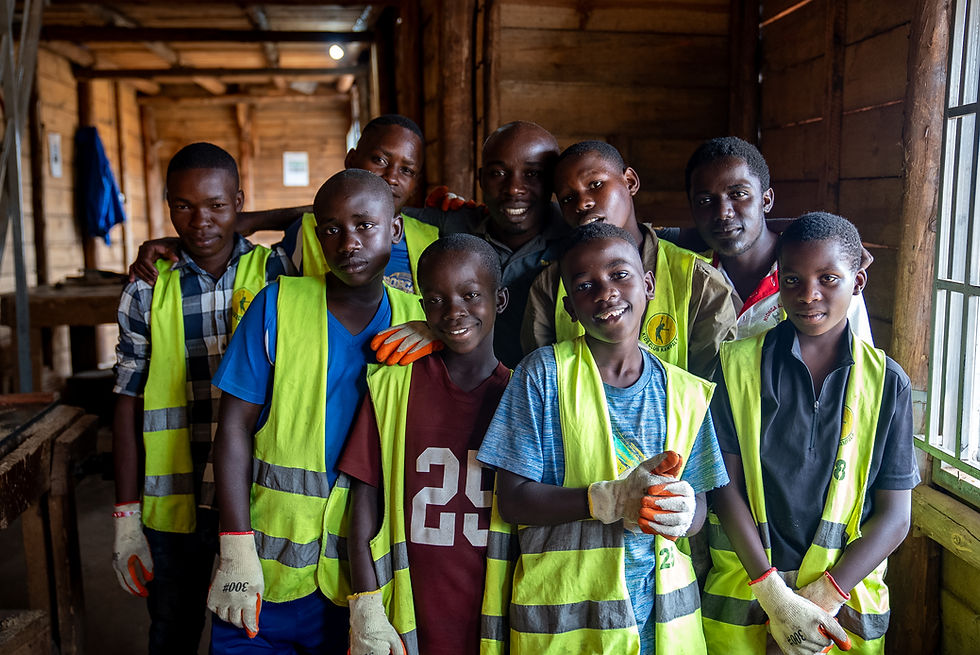Skilling for sustainability: breaking the cycle of poverty one life at a time
- Isabelle Bryan

- Aug 8, 2025
- 4 min read
In today’s shifting global landscape, international aid is undergoing a significant transformation. The USAID shutdown marked a pivotal shift in the U.S.'s role in global humanitarian funding, and similar reassessments are underway across Europe and the UK. These developments have placed increasing pressure on donors (trusts, businesses, and individuals alike) who are now inundated with funding requests.
As someone leading income generation at Kids Club Kampala, I often hear from donors who are reluctant to fund programmes that create long-term dependency. While they are generous and motivated to support good causes, they are cautious about becoming the sole lifeline for any one organisation. And quite rightly so. There are so many worthy causes that need support.
Poverty, however, remains a deeply entrenched challenge. According to the World Bank, approximately 700 million people, which is 8.5% of the global population, live in extreme poverty, surviving on less than $2.15 per day (https://www.worldbank.org/en/publication/poverty-prosperity-and-planet). This means aid funding will remain essential for the foreseeable future.
But there's a critical distinction to be made: dependency on aid versus support that leads to self-sufficiency. When funders invest in programmes that empower individuals to break out of poverty, they achieve a far more sustainable and satisfying return on investment. From a fundraiser’s perspective, few things are more rewarding than witnessing someone no longer needing our support.
Teaching to fish: the power of skills training
Coming from the Democratic Republic of Congo, I grew up hearing this African proverb: “If you give someone a fish, they will be hungry again, but if you teach them to fish, they’ll never go hungry.”
This principle lies at the heart of Kids Club Kampala’s Skills for Life project, a vocational training initiative rooted in the slum communities of Kampala, Uganda. The programme equips young people with practical, in-demand skills that unlock opportunities for employment and entrepreneurship.
Delivered from the purpose-built Hope Centre in Naguru slum, the programme includes:
Carpentry training for young men and boys, offering a full-time, year long, hands-on, accredited instruction that provides graduates with the tools and techniques needed in today’s job market.
Tailoring and knitting training for women, a four-month accredited course combining technical skills with business development. Women graduate with the confidence to pursue employment or launch microenterprises—boosting not only their income but their independence.
Since its launch in 2023, over 85% of Skills for Life graduates are now employed or running their own businesses. Sam Wambayo, Kids Club Kampala Managing Director, states that many have gone from no steady income to earning up to $300 per month, a substantial improvement in a country where the average monthly salary for a teacher is around 400,000 UGX (£84) and for a nurse, 500,000 UGX (£105). These figures represent more than income, they signify dignity, agency, and the chance to shape one’s future.

Nina* lost her husband 3 years ago whilst pregnant.
‘I was so stressed, I didn’t know what to do. I started hawking bananas, but I had to leave because I was just making losses. My neighbour told me about the Tailoring and Knitting Project which I joined early 2023. I acquired sewing skills first and then came back for the knitting skills. Immediately after graduation, a company called that makes reusable sanitary towels. I applied, and got the job. My life has changed very much ever since I got this job. I was able to send my kids back to school and take care of my family. I have also gained more experience, confidence, and friends.’
Rodney*, from our carpentry course, says:
“My name is Rodney*, I joined the carpentry project in November last year. I didn’t know anything about furniture making before joining the project but for the 5 months have been training, I am proud that I can make different products like stools, chairs, bookshelves, TV stands and others. I am extremely proud that I have even started making some money out of the skill when a friend of mine asked me to make a mini wardrobe for his daughter. This was my best experience because I put in all the required effort to produce something good and fortunately, he liked it more than I even thought he would like it. I am super proud being part of the project.”

(*Names changed to protect identity.)
Sustainability in practice
Poverty is a vast and complex issue, and yes, aid will be needed for a long time. But sustainable solutions lie in how we use that aid. The true measure of impact isn’t whether a programme continues to need funding, but whether the people it serves no longer do.
From a fundraiser’s perspective, sustainability means we may ask for support for the same programme, but not for the same beneficiaries. Each person who graduates from poverty is a shared success for the donor, the organisation, and the community.
To borrow the words of Archbishop Desmond Tutu (with apologies to my fellow non-meat eaters): “There is only one way to eat an elephant: one bite at a time.”
By equipping one person at a time with the tools to build a sustainable livelihood, we can chip away at the cycle of poverty and make lasting change.
To find out more about sustainable livelihood in East Africa and how you can support, please email isabelle@kidclubkampala.org




Comments